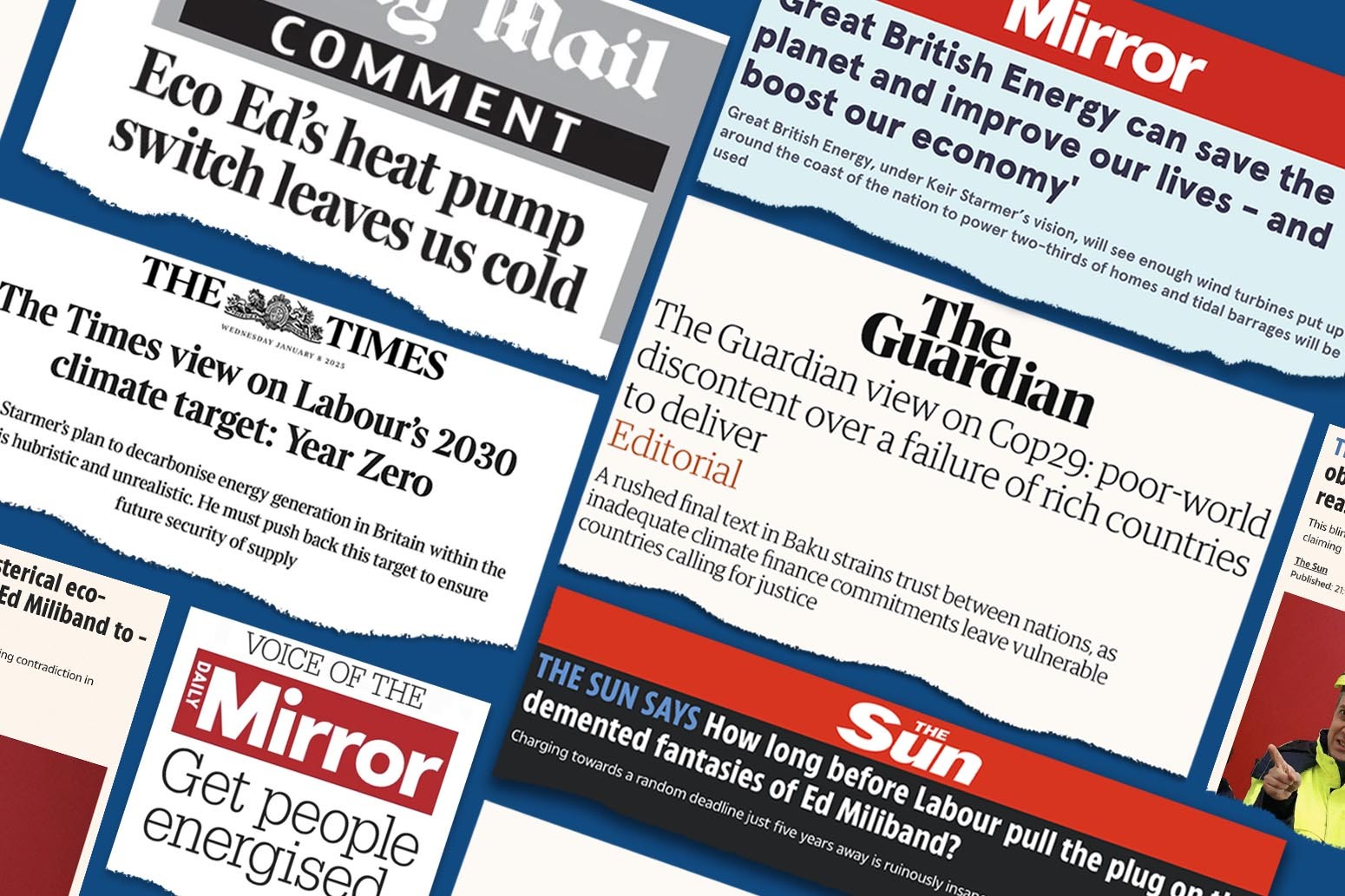Welcome to Carbon Brief’s DeBriefed.
An essential guide to the week’s key developments relating to climate change.
UK sees Labour landslide
‘HISTORIC’ RESULT: The UK Labour party has declared a “historic” victory in the country’s general election, while the Conservatives suffered their worst-ever defeat, the Financial Times reported. BusinessGreen said that Labour’s “sizeable majority” would provide the party with a “clear mandate for its ambitious green plans”. It added this includes a decarbonised power system by 2030 (more on this below), ending new oil and gas licences and a foreign policy “reset” based around international climate diplomacy.
GREEN SURGE: The UK’s Green party won three new seats in parliament, bringing its total number of MPs up to four, the Guardian reported. Across the UK, Green votes increased to around 7% from 2.7% of the vote share in 2019, from a total of 866,000 votes in 2019 to around 2m votes in 2024, according to Greenpeace. Below, Carbon Brief outlines some of the key climate players from across the parties that won seats in the early hours of this morning.
FREE WEBINAR: Following the results, Carbon Brief is hosting a free webinar at 10am UK time on Tuesday 9 July to discuss key climate issues facing the new Labour government. Carbon Brief journalists Dr Simon Evans and Molly Lempriere will be joined by Chris Stark, CEO of the Carbon Trust and former chief executive of the Climate Change Committee, Emma Pinchbeck, chief executive of Energy UK, and Camilla Born MBE, independent climate advisor and former UK senior official at COP26. Register here.
Hurricane Beryl wrecks havoc
KILLER STORM: Hurricane Beryl struck islands across the Caribbean and Venezuela this week, as the earliest category 5 hurricane ever recorded in the Atlantic, reported the Associated Press. The hurricane killed at least 11 people across islands including Grenada, St Vincent and the Grenadines, as well as in northern Venezuela, Reuters said.
‘ARMAGEDDON-LIKE’: After making landfall in the Grenadian island of Carriacou on Monday, the hurricane brought “devastating winds and storm surges” to Jamaica on Wednesday, Sky News reported. Beryl is now set to hit the Cayman Islands before moving further west and reaching the Yucatán Peninsula of Mexico, reported the Washington Post.
RECORD SEASON: The Financial Times noted that the US’s National Oceanic and Atmospheric Administration warned that there was an 85% higher chance of an above-average hurricane season in the Atlantic this year. According to the FT, NOAA said the increased risk was due to a “confluence of factors”, including record-breaking ocean temperatures, the onset of the natural weather phenomenon La Niña and reduced Atlantic trade winds, which allow hurricanes to grow in strength more easily.
Biden unveils heat protections
‘REALLY, REALLY DUMB’: US president Joe Biden has launched a first-ever federal workplace standard for extreme heat, reported the Guardian. If finalised, the standard “will substantially reduce heat injuries, illnesses and deaths for over 36 million workers”, Biden said. Announcing the rules, Biden took aim at Republicans working to undo his climate measures, calling such actions “really, really dumb”, the New York Times said.
CHEVRON DOCTRINE: The US Supreme Court overturned the principle that has guided UK regulatory law for the past 40 years, known as the Chevron doctrine, reported Inside Climate News. The sweeping away of the “Goliath” of modern law will weaken the Environmental Protection Agency’s legal authority, as courts “weigh Biden’s policies to cut greenhouse gases”, the publication said.
LNG PERMITS: A federal judge has ruled that the Biden administration must resume issuing permits for new liquefied natural gas (LNG) export facilities, the New York Times reported. The decision comes in response to a lawsuit filed by 16 Republican state attorney generals who argued that Biden’s pause on licensing, brought in to allow time to analyse how those exports affect climate change, amounted to a ban that harmed their states’ economies, it added. Bloomberg noted that the decision is “unlikely to immediately jump start approvals”.
- CHINESE FLOODS: Local authorities in China’s Hunan province declared a “wartime” emergency after torrential rainfall led to “the most severe flooding seen in 70 years”, the South China Morning Post reported.
- BRAZILIAN FIRES: Wildfires in the Brazilian Amazon in the first half of 2024 were the worst in 20 years, with 13,489 individual fires registered, Agence France-Presse reported.
- SBTi CEO RESIGNS: The head of the Science Based Targets initiative, Luiz Amaral, who came “under fire for a controversial decision to loosen guidelines around carbon offsets”, will step down at the end of July, Bloomberg reported.
- THOMPSON FIRE: Around 28,000 residents have been forced to evacuate in northern California after a wildfire broke out as the “state simmers in a brutal and potentially historic heatwave”, the Guardian reported.
- ‘FEROCIOUS STORMS’: Seven were left dead after “ferocious storms and torrential rains” hit France, Switzerland and Italy last weekend, Agence France-Presse reported.
- INDIAN LANDSLIDES: Heavy rains in northeastern India have “triggered floods and landslides in the region”, killing at least 16 people and displacing more than 300,000 over the last two weeks, Deutsche Welle reported.
The number of times women are more likely to die in extreme weather disasters, according to Women’s Environmental Leadership Australia, reported the Australian Associated Press.
- Tropical forest degradation due to “edge effects” – those at the edges of forests – is 200% higher than previously thought, increasing the areas more vulnerable to drought, a study published in Nature and covered by Carbon Brief found.
- As the climate warms, the cities of Hai Phong in Vietnam, Yangon in Myanmar and Bangkok in Thailand will all face increases in the peak intensity and duration of tropical cyclones, a new study published in npj Climate and Atmospheric Science indicated.
- The gradual trend towards a warmer and drier climate “poses immense uncertainty for the future of British festivals” stated the author of a new “short research article” published in Weather, which examined the “more extreme weather events” in Glastonbury festival’s history.
(For more, see Carbon Brief’s in-depth daily summaries of the top climate news stories on Monday, Tuesday, Wednesday, Thursday and Friday.)
One of the new Labour government’s key manifesto pledges is to reach “zero-carbon electricity” by 2030. While this target is seen as extremely ambitious, the UK has already made significant progress in slashing fossil fuels while rolling out renewable power. Under the Conservatives, coal power has already been all but phased out, falling from 40% of electricity generation in 2012 to near-zero in 2024, just 12 years later. To meet its target, Labour will need to phase out unabated gas twice as fast, from 29% in 2024 to near-zero in 2030.
Key climate figures in the new UK parliament
After a “historic” win for the Labour party and loss for the Conservatives in the UK’s general election, Carbon Brief takes a look at who will be setting the climate agenda in the years to come.
The Labour party has secured a landslide victory in the country’s general election, winning 412 seats in parliament, up by 211 from 2019.
Former Labour leader and MP for Doncaster North Ed Miliband is expected to take on the role of energy security and net-zero secretary, leading one of Labour’s “five main missions”, to “make Britain a clean energy superpower”. This includes targeting lower energy bills, creating jobs and delivering energy security by transitioning to zero-carbon electricity by 2030, the party said.
Beyond the department of energy security and net-zero, other key ministers who will have a say in steering a range of climate and energy policy over the next five years are likely to include Louise Haigh as secretary of state for transport, Steve Reed as secretary of state for environment, food and rural affairs and Rachel Reeves as chancellor of the exchequer.
Beyond government positions, a number of pro-climate action Labour MPs have won seats, including:
The Green party also won four seats and the Liberal Democrats won 70.
According to research by Greenpeace and Friends of the Earth in June, these two parties had the most environmentally friendly manifestos, with the Greens and Liberal Democrats scoring 39 and 32 out of 40, respectively. (Labour scored 21).
Greens MPs include co-leaders Carla Denyer, who beat Labour’s shadow culture secretary Thangam Debbonaire by 10,000 votes in Bristol Central, and Adrian Ramsay, who overturned a 22,000 Conservative majority in Waveney Valley, with a 32.1% swing to the Green Party.
Additionally, Siân Berry has won Brighton Pavilion, the seat previously held by former Green MP Caroline Lucas.
For the Liberal Democrats, it was a “record-breaking” night with the number of seats held by the party surging from 11 in 2019.
This includes Pippa Heylings for South Cambridgeshire, who was team leader for the UK’s Global Biodiverse Landscapes Fund at the multinational company PwC. She also founded the climate-focused advisory company Talking Transformation, along with other climate-focused Liberal Democrat MPs.
Watch, read, listen
CONSPIRACY INFLUENCERS: Rolling Stone took a look at how Europe’s “conspiracy influencers” have gone from a focus on Covid-19 to climate change, with conspiratorial narratives about climate action entering the mainstream.
FOOD PRICES: A “big read” in the Financial Times looked at how shifting weather patterns are “reducing crop yields and squeezing supplies”, which could create a permanent source of inflation.
ELECTION MEANING: Ahead of the UK general election, Carbon Brief’s deputy editor and senior policy editor Dr Simon Evans spoke to Michael Liebreich and Baroness Bryony Worthington about what the results mean for climate and energy on the Cleaning Up podcast.
- Global Campaign to Demand Climate Justice, communications coordinator | Salary: Up to $38,400. Location: Fully remote, preferred location in the global south
- Uplift, senior political adviser | Salary: £46,259-£50,548. Location: London
- Sustainable Housing Observatory, senior project manager – adaptation to climate change | Salary: Unknown. Location: Paris
DeBriefed is edited by Daisy Dunne. Please send any tips or feedback to [email protected].
This is an online version of Carbon Brief’s weekly DeBriefed email newsletter. Subscribe for free here.
Sharelines from this story




















Discussion about this post